- Home
- Jim Fergus
The Wild Girl Page 4
The Wild Girl Read online
Page 4
It is among my duties to take care of the guests, which from my years at the club is an occupation in which I’ve had a good deal of practice. It’s also my job to photograph the sports with their trophies. I print the film myself in a makeshift darkroom off the bunkhouse and give these portraits to the guests as a memento of their visit. Mr. McGillivray seems very pleased with my work and the other day he asked me to stay on full-time at the ranch. “I’ve known you at the club since you were a boy, lad,” he said. “You’re practically like a son to me. Why don’t you stay here and work for me, give up this wild Apache chase. I’ll make it worth your while, Ned.”
I have to admit, it was a tempting offer. “I really like it here, sir,” I answered. “But just now I’ve got my heart set on going down to Mexico. Maybe if I don’t get hired on by the expedition, I’ll come back if you still need me. Or maybe after it’s over, if there’s still a place for me.”
“There’s always a place for you at the Circle J, lad,” Mr. McGillivray said.
To tell the truth, as much as I like Mr. McGillivray and appreciate his kindness to me, I’m kind of tired of working for rich people. Maybe it’s just from listening to Jerry Mackey and his comrades ranting about the ruling classes, or maybe it’s simply from all my years at the club. Maybe it’s from the past weeks of travel, and all the people I’ve encountered on the road who are out of work and on the move. I don’t know, it’s hard to explain, but I feel like everything has changed in the last few months … well, of course, everything has changed. I’ve been thinking a lot about Pop recently, and I realize that he made up to rich people all his life, he denied his family’s politics and working-class roots in order to try to conform to some notion of being a successful Republican capitalist. His own father worked himself to death clubbing steers over the head with a sledgehammer in a meatpacking plant in the Chicago stockyards so that his son could get an education and start his own business, so that his son’s son could clean his father’s brains off the bathroom wall. It’s a lot to think about, isn’t it?
Speaking of rich people, here’s a story for you … This week a man from Philadelphia named Tolbert Phillips, whose family made their fortune in the railroad business, came to the ranch with his son, Tolbert Jr. Tolley, as he is known, is a couple of years older than I am, a tall, gangly foppish Ivy League kid, who reminds me of all the entitled young men whose tennis balls I fetched during their summer lessons when I was a kid. Except this guy acts like a damn girl. Evidently Tolley’s father is an old friend of Mr. McGillivray’s and brought his son down here to shoot a bison as some sort of rich boy’s rite of passage.
Young Tolley arrived for the hunt dressed head to toe in an Abercrombie & Fitch khaki safari outfit, complete with pith helmet. “Don’t you just love a man in uniform?” he whispered to me, seemingly oblivious to how ridiculous he looked, even absurdly proud of it. For his part, Mr. Phillips, who is a gruff, imperious man, was clearly ashamed of his son, and after Tolley had bagged his bison, his father left him with me in the field while I set up my camera to take his portrait. As I was doing so, Tolley inspected the bull, lifting the animal’s hind leg.
“What are you doing, anyway?” I asked.
“Checking out his equipment,” Tolley said.
“Why the hell would you do that?”
“Comparing him to the Cape buffalo. I’ve been to Africa, you know?”
“No, I didn’t know that,” I answered.
“Father is constantly shipping me off on these sporting adventures,” he said, “in the hopes that they’ll make a man out of me. As you may have guessed, Giles, I like boys.”
I’ve never heard anyone admit to such a thing before. “Ah, no, I hadn’t really guessed that,” I said.
“To tell the truth, I wasn’t really all that interested in the big-game hunting,” Tolley said. “But there are no end to the lovely young men available in Nairobi. Even on safari, I had my own tent boy.”
This was much more than I cared to know about Tolbert Phillips Jr.’s predilections. “Okay,” I said hurriedly. “All set. Let’s shoot this portrait.”
“I’m going to pose holding the bull’s pizzle in my hand,” Tolley announced.
“What are you talking about?”
“You heard me, old sport.”
“Why would you want to do such a thing?”
“Why? To amuse my circle of close friends, of course,” Tolley said. “If you understand my meaning.”
“No, I really don’t,” I said. “I don’t understand a thing about it. And I don’t want to have anything to do with it.”
“Oh, don’t be such a prude, old sport,” Tolley said. “We’ll call it The Buffalo Hunter’s Reward. God, imagine how it will infuriate Father!”
“Why would you want to make your father mad?” I asked.
Tolley looked at me with a tolerant expression. “You’re rather naive, aren’t you, Giles?” he said.
“I guess so.”
“Well, that’s all right, old sport,” he said. “Because all you really need to know is that I’m the guest and you’re the employee. Now let’s make that portrait, shall we?”
18 MARCH, 1932
Goodnight, Texas
Yes, well, I shot Tolley Phillips’s portrait just as he requested, and for my efforts I got called into Mr. McGillivray’s office this morning.
“Sit down, Ned,” he said from his chair behind the desk, and I knew right away that I was in for it. “I’ve known you for a long time, lad. You’ve always been a good boy.” He held out my photograph of Tolley and dropped it on the desk in front of me. “It seems quite unlike you to pull a stunt like this.”
“I’m sorry, sir,” I said. “But that’s how Tolbert asked to have his photo taken. I think he just meant it as a joke.”
“A distinctly bad joke,” Mr. McGillvray said. “A sick, perverted joke.”
“Yes, sir,” I admitted. “I didn’t think it was very funny, either.”
“But you took the photograph, didn’t you, Ned?”
“Yes, sir,” I said. “Because Tolley asked me to. And he’s your guest.”
“Tolbert’s father is an old and dear friend of mine,” Mr. McGillivray said. “He was not in the least bit amused by your tasteless photograph of his son.”
“No, sir, I don’t imagine that he was,” I said.
“I’m afraid that I have no choice but to let you go,” Mr. McGillivray said.
“Let me go, sir?” I asked, stunned. “But I was just following the wishes of the guest.”
“I think you must understand, lad, that I cannot have my employees intentionally humiliating my guests in such a manner.”
I’ve never been fired from a job before and I could feel the blood rising to my face, not just from the shame of it, but also from anger at the casual power which the wealthy yield in dismissing others from their lives. “But I wasn’t trying to humiliate anyone, Mr. McGillivray,” I said. “Honest. I was only doing what the guest asked.”
“You could have refused, lad,” he said. “You showed very poor judgment.”
“I’m just an employee, sir,” I said. “I’m taught to do what my employer and his guests ask of me. That’s always been my job.”
“That will be all, Ned,” Mr. McGillivray said. “I’d appreciate it if you’d pack your bags tonight and leave first thing in the morning. You can collect your final paycheck from Mr. Cummins before you go.” Mr. McGillivray busied himself with the papers on his desk, as a sign that the interview was over.
I sat there for a moment, dazed, unable to move. And then I said: “Sir?”
Mr. McGillivray looked up as if surprised and mildly irritated to see me still there. “Yes, what is it, Ned?” he asked impatiently.
“The other day you said I was like a son to you, sir.”
The man met my gaze and held it. He frowned thoughtfully and shook his head with a brisk finality. “No, lad,” he answered pointedly, pushing away from his desk and standing, “I said
‘practically like a son.’ What you are is an employee, who has been fired.”
That was a good lesson to learn. And it was almost time to move on anyway.
26 MARCH, 1932
Eastern New Mexico
From Texas I am traveling south and west, through the choppy sandhills of eastern New Mexico—big, arid, empty country. The tiny towns are few and far between, and many of them have been abandoned, their storefronts boarded up and posted with signs that read FOR SALE, GONE BROKE, CALIFORNIA OR BUST. A cold winter wind moans through the broken windows of deserted homesteads, and in the fields, the dried stalks of last season’s failed wheat and corn crops sprout brown and withered from the drought-cracked earth. It is lonely country and I am lonely in it.
I’ve stopped for the night in an abandoned clapboard farmhouse outside Pep, New Mexico. I don’t think its previous owners will mind. Still, I can’t shake the odd sense I have that they’re going to come home suddenly and discover my trespass. I walk quiet as a thief through the silent, empty rooms, imagining the people who once lived here, hearing their voices and laughter. On the floors lies the detritus of their lives left behind, a child’s crayon drawing … a bald one-armed doll … last year’s Montgomery Ward catalog with the corners of some of the pages so hopefully turned down … an empty whiskey bottle … a foreclosure notice from the bank. Earlier, while I still had enough light, I set up my camera and tripod and made some negatives of the interior of the house, half expecting that when I print them, the family will materialize like ghosts in the photographs … as I once believed that my parents would magically reappear on earth.
They’ve left their kitchen cookstove behind, probably it was too heavy for them to transport, and as the nights are cold, I’ve built a fire in the grate, gathering scrap wood from the collapsed chicken coop out back and branches from a dead elm tree in the yard. I found a discarded chair on the porch and an old bench to use as a table. I tidied the place up just as if I were the new tenant, sweeping the mouse droppings away with a broken-handled broom. I spread my bedroll on the floor and lit my kerosene lantern.
I had to learn to cook a little after my mother got sick. Pop was hopeless in the kitchen and it was that or a steady diet of baloney sandwiches. I travel with a kitchen box that contains a cast-iron skillet and pot, a tin coffeepot, plate and coffee cup, basic utensils, and a few staples such as salt, sugar, flour, and coffee—everything I need. A pot of beans simmers on the stove and I bought a thin steak at a butcher shop in Portales this morning. I’ll fry it up with onions and eat it with the beans and some fresh tortillas that I bought from a Mexican lady there. I have a single precious tomato that I bought in the general store and which I’ll chop up over the steak. It’s really not much of a tomato, small and wrinkled, but still it looks so brilliantly red against this gray winter scene.
And so I’ve made myself right at home here. The cookstove warms the kitchen nicely and it’s kind of cozy. But I can hear the winter wind moving around through the house like another restless traveler, and outside the window the big empty country lies lonesome in the dusk.
4 APRILs, 1932
Douglas, Arizona
Today is my seventeenth birthday and I have arrived at last at my destination. I make this entry parked along the side of Main Street in Douglas, Arizona. The high desert air is cool and still, one of those limbo days that seems neither winter any longer nor quite yet spring. The sun is low on the western horizon, lighting the pale mountains to the east with soft color but without warmth. The town itself has that feeling of semiabandonment which has become so familiar to me in my travels, a scruffy, down-at-the-heels border town with empty storefronts, broken windows, and deserted streets.
It’s been over two months since I left Chicago, and now that I’m here I don’t think I’ve ever felt so lonely and homesick in my life. The desert I’ve been driving across these past few hundred miles seems harsh and alien. I am a stranger here in strange country. Away to the south, across the border into Mexico, I can see the high jagged peaks of the Sierra Madre Mountains, rising like monsters above the plains. In the late-afternoon light they seem a far less romantic place than I had imagined; they seem only hard and rocky and inhospitable …
I am scared. There, I’ve said it. I’m thinking about turning the Roadster right around and heading back to Chicago. But everything that is familiar to me there is gone … my parents, my house, my room. I have nothing to go back to. So I’m just going to sit here for a while and try to regain my courage. I don’t know what’s the matter with me. The sun is setting and the cold desert air seems to be falling down upon me like stones from the sky above. I wish Mom and Pop were still alive. I wish I could have stayed in Chicago, finished college, and taken a steady job. Maybe I could have gone into Pop’s automobile business with him and he wouldn’t have killed himself. I could have married Annie Parsons and had a family of my own … Have a nice life, Ned Giles, Annie said.
There … I have just finished weeping, sitting in the car parked on the side of the street in Douglas, Arizona, on my seventeenth birthday bawling like a damn baby. It’s the first time I’ve cried for my parents … the first time I’ve cried for myself … and now I’m all hollowed out.
5 APRIL, 1932
Douglas, Arizona
When I read what I wrote yesterday, I’m ashamed of feeling so sorry for myself, for being such a big crybaby. So much has happened in the past twenty-four hours that everything is different now. I hardly know where to begin. If I hadn’t promised to always be honest in these pages, I’d cross out my entire last entry.
After I’d had my little cry, I started the car up again and drove on into town. Because it was my birthday and because I was feeling so blue, I decided to treat myself to a hotel room, a bath, and a steak dinner. I had no trouble at all finding the Gadsden Hotel at the end of Main Street. It’s a grand five-story stone building that seems completely out of place in this scruffy little border town.
It’s even grander inside, and as soon as I walked in I could see that it was way beyond my means. I stood in the lobby craning my neck at the exposed balconies that spiral upward from a massive central staircase built of white Italian marble. The stairs lead to a mezzanine framed by four enormous marble columns decorated in gold leaf and spanned by a forty-two-foot-long Tiffany stained-glass mural. The lobby was full of Great Apache Expedition volunteers, milling around or sitting chatting in islands of plush velvet furniture.
The desk clerk was a slender, dapper fellow dressed in a dark suit and bow tie. I was dressed myself in dungarees and a T-shirt, and he raised his eyebrows when I walked up, sizing me up quickly and professionally as one clearly unsuited to such luxury. I know the look, and I know from my experience working at the club that the only people capable of being snootier than the rich are those who work for the rich.
“May I help you, sir?” he asked with an imperious English accent, making it clear from his tone that he probably couldn’t.
“Yes, I’d like a room, please,” I said, trying to appear older than my years, and somehow magically better dressed.
“Do you have a reservation, sir?”
“Not exactly.”
“I beg your pardon, sir?”
“No, I don’t have a reservation.”
“Ummm. Pity.” He pursed his lips and made a show of consulting the register, running a dry, papery finger swiftly down the page. “We’re terribly busy, sir,” he said. “You see the volunteers for the Great Apache Expedition are beginning to arrive.”
“Yes, that’s why I’m here myself,” I said. “I read the flyer at my club in Chicago and thought I’d come down here and see about signing on.”
“You’re a member of a private gentlemen’s club, then, are you, sir?” he asked, looking up with raised eyebrows.
“Well, not exactly a member,” I admitted. “I worked at the Chicago Racquet Club. I’m hoping to get hired on in a paying position with the expedition.”
The desk clerk
smiled knowingly. “Ah, yes, of course you are, sir,” he said, “you and everyone else in town.”
“I’m a really good photographer,” I said.
“Yes, sir, I’m quite sure you are,” said the desk clerk. “Nevertheless, I’m afraid that I have nothing available at all tonight.”
“You’re completely full?”
“It would seem so, sir.”
“Would you have a room for me if I was a member of a club rather than an employee?” I asked.
“Dashed unfair, I know, sir,” he said. “But I have strict instructions to hold the remaining rooms for expedition volunteers.”
“Instructions from whom?” I asked. “Isn’t my money as good as theirs?”
“From the management, of course, sir,” he said. “I only work here.”
And then from behind me came a vaguely familiar voice. “Put Mr. Giles in the spare room in my suite, Mr. Browning. It has nothing in it but my polo gear.”
I turned around to find Tolbert Phillips Jr., tall and gangly and tanned, dressed in natty white slacks and a polo shirt, his hair slicked back, a striped tennis sweater draped over his shoulders, as if he’d just come in off the court. He beamed affably at me, with a goofy, expectant look, as if we were the best of old friends.
“Giles, old sport!” he said. “Tolley Phillips! The Circle J Ranch, Goodnight, Texas. Remember?”
“How could I forget?” I said. “What are you doing here, Tolley?”
“Volunteering for the Apache expedition, of course,” he answered. “Another of Father’s schemes to make a man out of me. Which, as you can plainly see, is a losing cause. God, I wish you could have seen his face when he saw the portrait you took of me, Giles. It was absolutely delicious!”
“Yeah, well, it wasn’t so delicious for me, Tolley,” I said.
“I know, and I’m terribly sorry about that, really I am. Of course, I took full responsibility.”
“A lot of good that did me,” I said. “I got fired over your little prank.”

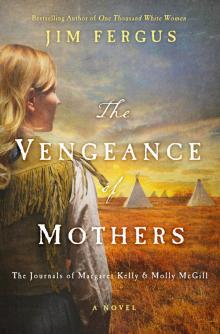 La Vengeance des mères
La Vengeance des mères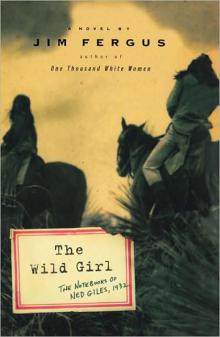 The Wild Girl: The Notebooks of Ned Giles, 1932
The Wild Girl: The Notebooks of Ned Giles, 1932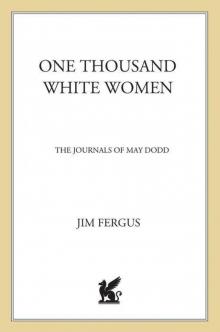 One Thousand White Women
One Thousand White Women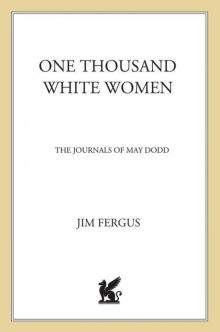 One Thousand White Women: The Journals of May Dodd
One Thousand White Women: The Journals of May Dodd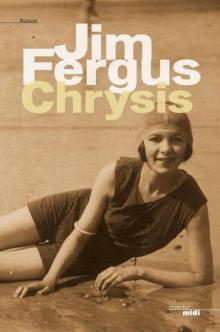 Chrysis
Chrysis Strongheart: The Lost Journals of May Dodd and Molly McGill
Strongheart: The Lost Journals of May Dodd and Molly McGill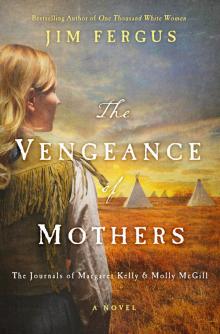 The Vengeance of Mothers
The Vengeance of Mothers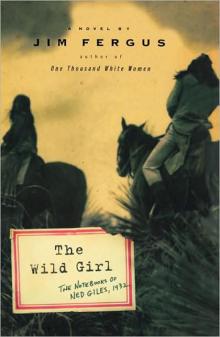 The Wild Girl
The Wild Girl